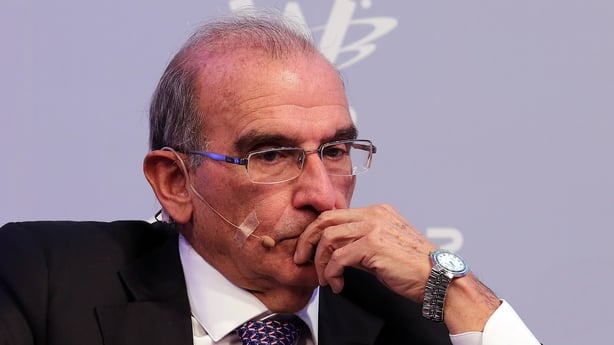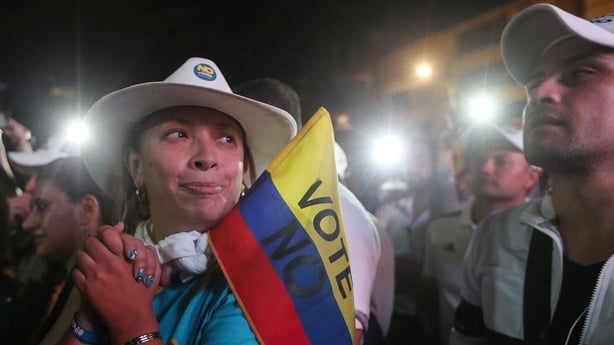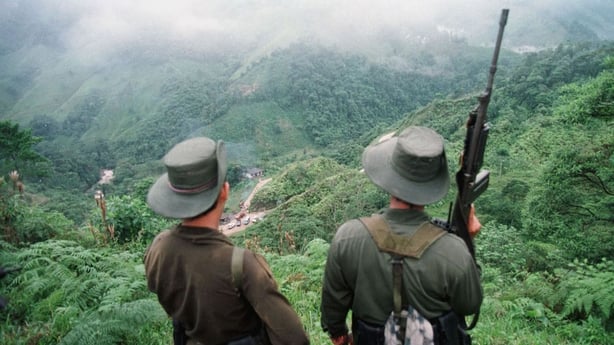The Colombian government's chief peace negotiator in peace talks with the Marxist FARC guerrillas, Humberto de la Calle, has offered his resignation after voters narrowly rejected a peace deal with the rebels.
Voters rejected the hard-negotiated deal as too lenient on the rebels in a shock result that plunged the nation into uncertainty.
"Any mistakes we made are my responsibility alone," Mr Calle told journalists at the presidential palace.

"As a result, I have come to tell the president [Juan Manuel Santos] that I am offering to stand down as head of the delegation, because I will not be an obstacle to what comes next."
Putting on a brave face after the major political defeat, President Santos offered hope to those who backed his four-year peace negotiation with the Revolutionary Armed Forces of Colombia (FARC) in Cuba.
Latin America's 52-year conflict has killed 220,000 people. The pact to end the civil war was negotiated in the Cuban capital Havana.
"I will not give up, I will keep seeking peace until the last minute of my term," the president said moments after losing yesterday's plebiscite to those who want a re-negotiation of the deal or an obliteration of the FARC on the battlefield.
More than 13 million people cast their ballots but the deal was rejected by just under 60,000 votes with 50.24% voting against the accord.
Mr Santos was to meet all political parties today and Mr Calle in Havana to speak to the FARC leadership.
Rodrigo Londono, the top FARC commander better known by his nom de guerre Timochenko, also offered reassurance that the rebels remain committed to becoming a peaceful political party.
He said the result "fills us with more enthusiasm, makes us much more committed, because there are various ways to read it and we must analyse them to see what needs to be fixed".
Mr Santos, who was not obliged by law to hold a plebiscite, had said there was no Plan B for the failure of the peace vote, but now appears ready to consider options.
We need your consent to load this rte-player contentWe use rte-player to manage extra content that can set cookies on your device and collect data about your activity. Please review their details and accept them to load the content.Manage Preferences

Meanwhile, UN chief Ban Ki-moon has said he had "urgently" sent his Colombia envoy to Havana for talks following the rejection of the deal.
He told reporters in Geneva: "I have seen the results of yesterday's plebiscite. We would have hoped for a different result.
"I have urgently dispatched my special representative Mr Jean Arnault to Havana to continue his consultations."
Eamon Gilmore, the EU's Special Envoy to the peace process in Colombia, believes there will be political dialogue to try to find a way forward.
Speaking from Bogota on RTÉ's News at One, Mr Gilmore said: "We know from our own experience that peace agreements aren't built sometimes in one go."
The former tánaiste said that there is a process of political dialogue that will begin today with President Santos meeting the political leaders and will continue "and I hope that that will lead to a unified approach in the country to building a peace agreement."
He said a number of issues concerned opponents of the referendum.
The peace accord reached last month and signed a week ago offered the possibility that rebel fighters would hand in their weapons to the United Nations, confess their crimes and form a political party rooted in their Marxist ideology.
The FARC, which began as a peasant revolt in 1964, would have been able to compete in the 2018 presidential and legislative elections and have ten unelected congressional seats guaranteed through 2026.
That enraged No supporters, including powerful former president Alvaro Uribe, who argued the rebels should serve jail terms and never be permitted to enter politics.
Mr Uribe, a one-time ally who has become Mr Santos' fiercest critic, may now hold the key to any potential re-negotiation.
While the FARC has refused to serve traditional jail terms, it may see no future in returning to the battlefields and so consider some sort of new deal.
"In the end, the people have spoken: the Colombian government and the FARC have no choice but to renegotiate," said Peter Schechter, director of the Adrienne Arsht Latin America Center.

The FARC already softened its stance in the original negotiation, publicly admitting for the first time it trafficked drugs, recruited minors and committed human rights violations, including massacres.
But voters worried the rebels would fail to turn over assets from drugs and illegal mining, potentially giving them a formidable war chest that could outstrip the coffers of traditional parties.
Regions still riven by the conflict, including poor areas along the Pacific and Caribbean coasts, voted resoundingly in favour of the deal, but formerly violent interior areas pacified during the Uribe presidency largely backed the No camp.
The vote may delay Mr Santos' plans to move on to other matters including much-needed tax reform and other macroeconomic measures to offset a drop in oil income.
It will also dent his hopes for a boom in foreign investment in mining, oil and agriculture in Latin America's fourth-largest economy.

